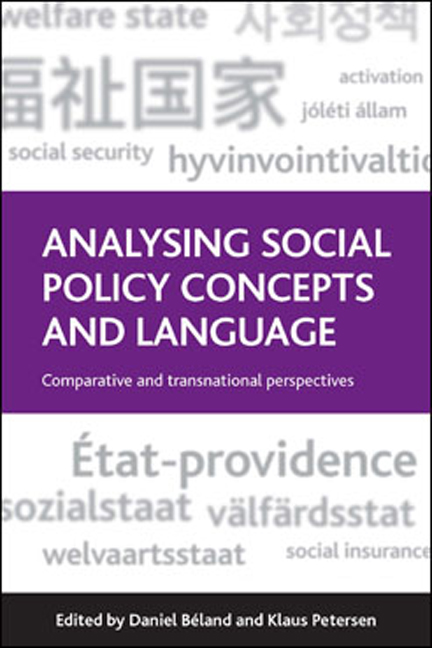Book contents
- Frontmatter
- Contents
- List of figures and tables
- Acknowledgement
- Notes on contributors
- Introduction: social policy concepts and language
- one Social policy language in Denmark and Sweden
- two The changing language of social policy in Hungary and Polan
- three Languages of ‘social policy’ at ‘the EU level’
- four The OECD's search for a new social policy language: from welfare state to active society
- five The discursive power of international organisations: social policy language and concepts in the World Bank and the International Monetary Fund
- six Original and imitated or elusive and limited? Towards a genealogy of the welfare state idea in Britain
- seven Social policy concepts and language in France
- eight The language of social politics in Finland
- nine Germany: constructing the ‘win-win’ society
- ten Conceptual development of welfare and social policy in Japan
- eleven Transition to the ‘universal’ welfare state: the changing meaning of ‘welfare state’ in Korea
- twelve The Dutch ‘caring state’
- thirteen Panacea, problem or perish: social policy language in New Zealand
- fourteen Evolving social policy languages in Spain: what did democracy and EU membership change?
- fifteen Social policy language in the United States
- Conclusion: comparative perspectives on social policy language
- Index
eight - The language of social politics in Finland
Published online by Cambridge University Press: 04 March 2022
- Frontmatter
- Contents
- List of figures and tables
- Acknowledgement
- Notes on contributors
- Introduction: social policy concepts and language
- one Social policy language in Denmark and Sweden
- two The changing language of social policy in Hungary and Polan
- three Languages of ‘social policy’ at ‘the EU level’
- four The OECD's search for a new social policy language: from welfare state to active society
- five The discursive power of international organisations: social policy language and concepts in the World Bank and the International Monetary Fund
- six Original and imitated or elusive and limited? Towards a genealogy of the welfare state idea in Britain
- seven Social policy concepts and language in France
- eight The language of social politics in Finland
- nine Germany: constructing the ‘win-win’ society
- ten Conceptual development of welfare and social policy in Japan
- eleven Transition to the ‘universal’ welfare state: the changing meaning of ‘welfare state’ in Korea
- twelve The Dutch ‘caring state’
- thirteen Panacea, problem or perish: social policy language in New Zealand
- fourteen Evolving social policy languages in Spain: what did democracy and EU membership change?
- fifteen Social policy language in the United States
- Conclusion: comparative perspectives on social policy language
- Index
Summary
Among the five representatives of the Nordic model, Denmark, Finland, Iceland, Norway and Sweden, each an exception in its own way, Finland may easily qualify as the most exceptional one. Finland was a latecomer in industrialisation and urbanisation, and it was also the Nordic latecomer in the field of social policies and industrial relations. Connections and conflicts with the Czarist and Soviet Empires are a particular dimension of Finland's history, and the class based Civil War of 1918 and the two wars against the Soviet Union (1939–40 and 1941–44) as a part of the Second World War had many political, not least social political, implications. In a study of concepts and language, the Finnish exceptionality may appear especially striking, as the Finno-Ugric language of the majority of the population of Finland is totally different from the Scandinavian languages.
It would be possible to analyse Finland as one of the new nationstates that were built after the collapse of the Eastern and Central European multi-ethnic empires. Finland was declared independent after the October Revolution, in December 1917. In January 1918, the Civil War began between the socialist Reds and the bourgeois Whites, preconditioned by the international crisis and domestic class based conflicts. It ended in the victory of the Whites in May 1918. Despite the counter-revolutionary outcome of the Civil War, however, Finland was by the Constitution of 1919 established as a parliamentary republic. Again, this solution had its prerequisites in international transformations. The alliance of the White winners with the German Empire lost its basis as the German Empire not only lost the World War but also dissolved through revolution. Importantly, however, parliamentary democracy was sustained in Finland in the 1920s and 1930s as the form of political system, even though it was threatened by right-wing groups, especially in the early 1930s. The sustaining of democratic forms made Finland exceptional among the new nationstates created through the collapse of the empires.
Any explanation of this exceptionality must recognise that the Nordic political traditions had played a crucial role in the Finnish nation building. Sweden lost its Eastern provinces to Russia in the Russian–Swedish War of 1808–09, which was related to the Napoleonic wars.
- Type
- Chapter
- Information
- Analysing Social Policy Concepts and LanguageComparative and Transnational Perspectives, pp. 157 - 176Publisher: Bristol University PressPrint publication year: 2014
- 2
- Cited by



